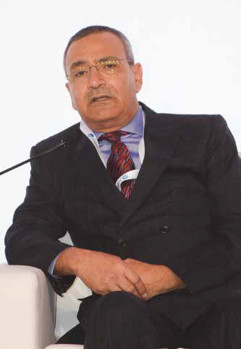Hunger Is Still a Major Challenge for the World, Says Abdul Majeed Yahya
Civil conflicts across the globe have caused untold suffering due to extreme poverty, which has locked many people out of reach of basic services in education and health. Eradication of poverty in all its forms tops the priority list of the 17 Sustainable Development Goals (SDGs) that UN member states undertook to achieve by 2030.
On the sidelines of the recently concluded 2019 Knowledge Summit in Dubai, Randa Gerges spoke to Abdul Majeed Yahya, the Director of the World Food Program (WFP) United Arab Emirates country office and representative to the Gulf Cooperation Council (GCC), about the efforts and challenges in fighting poverty and hunger in the world.
Is there any progress in achieving the elimination of hunger in the world?
Unfortunately, despite the progress achieved over the past ten years, in 2018 we saw an addition of 10 million people to the total number of hungry people. This brought to a total of 820 million people around the world who lack food, sleep every night without dinner, or do not know where the next meal will come for them. The numbers increased among the poor and there are great threats of the current numbers going up. There are more than 700 million people, an equivalent of 10% of the World’s population, that live in extreme poverty.
What are the main challenges in the efforts to eliminate hunger?
Efforts to end hunger have been slowed down by events like armed conf licts that impede access to food for people in conf lict areas. The other issue is economic marginalization, which prevents many people from accessing economic opportunities. The third challenge that we see repeatedly is climate change. It prevents those working in agriculture from producing food in the required quantities. In developing countries, small farmers produce 80% of the food required, and what must be emphasized is that these small farmers are the groups that suffer most from food insecurity, climate shocks, drought, floods, access to markets, as well as storage facilities are not available to them. Therefore, all of these challenges make eradicating poverty and hunger a complex process.
What is WFP’s experience in distributing food aid in conflict areas?
It is not easy but this is our field of work. Two-thirds of the people we provide with food reside in areas where military conflict is widespread. Since World War II, we have been laying strategies for dealing with these situations. There are humanitarian negotiations that enable us to reach these places. This process is not safe at all but this is a responsibility we were entrusted with by the world. We have many people who have lost their lives, plus those who were kidnapped while doing their work, but that is the price of this humanitarian work. We as a team do it and are fully aware of all the risks that we can be exposed to. Therefore, we emphasize that the steps to eradicate poverty, the primary cause of hunger, and get rid of the factors that increase its prevalence rates, begin by ending these conf licts and wars, as well as developing plans to face changes of climatic conditions such as droughts and f loods that destroy the land and cause damage to agriculture. In these bad conditions, farmers are forced to migrate and move to other places in search of food.
What approaches have you employed in the campaign to end hunger?
Today, there are millions of people suffering from hunger and extreme poverty, most of them live in conflict and war zones. We have managed to reach 90 million people, thanks to the concern and generosity of the WFP donors. Supporting the needy by providing them with basic needs requires about $9 billion. Because saving people’s lives from natural and environmental disasters is an essential part of the work that we do, and in order to achieve the goal of the complete elimination of hunger by 2030, to be able to provide the appropriate foodstuffs, we must change their lifestyle, empower them, and develop them so that they can be able to help themselves.
What are your future plans for achieving total eradication of hunger?
We are focusing on working with small farmers as most of the food is produced by them. Here, it is worth noting that a large percentage of them also suffer from poverty and hunger, they do not have mechanisms for storing their crops, and they do not know the correct marketing methods. Our role in the World Food Program is purchasing these crops from them or directing and teaching them the proper storage methods so that they can improve their livelihood and get greater benefits from their products. All international and local institutions and organizations must join hands and spread awareness among individuals to contribute.








